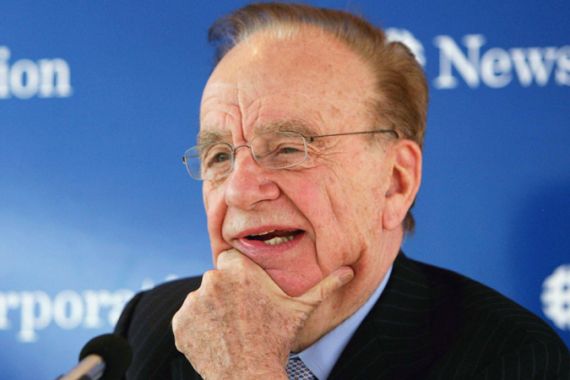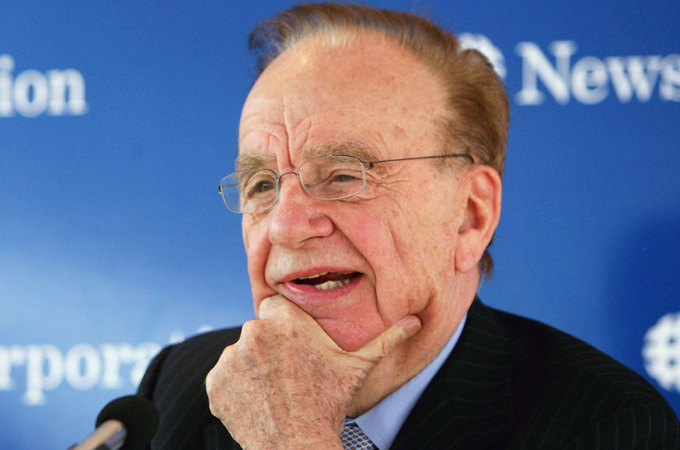Profile: Rupert Murdoch
The CEO of News Corp, one of the world’s biggest media companies, built a global news and entertainment empire.

 |
| Rupert Murdoch, chairman of News Corp, one of the world’s biggest media companies [Gallo/Getty] |
Australian-born media mogul Rupert Murdoch built an empire on lurid headlines, but the hacking scandal which has felled one of his top tabloids is the biggest controversy of his career.
Murdoch took the explosive step of killing off his 168-year-old News Of The World in June 2011, after a furore in Britain over claims the paper hacked phones of relatives of murdered children and victims of the London bombings.
Keep reading
list of 4 itemsUK returns looted Ghana artefacts on loan after 150 years
Fire engulfs iconic stock exchange building in Denmark’s Copenhagen
Inside the pressures facing Quebec’s billion-dollar maple syrup industry
The media baron, 80, had condemned as “deplorable and unacceptable” the claims, but the decision by a man said to have “newsprint in his veins” to close the scandal-hit Sunday title was completely unexpected.
Murdoch’s purchase of the News of the World in 1969 gave him a high-profile foothold in the British market. He went on to buy The Sun, which he turned into a popular tabloid, resulting in a massive rise in circulation.
The consequent boost in profits helped finance his 1981 purchase of The Times and Sunday Times, both prestigious broadsheets, in an acquisition that met with intense opposition from parts of Britain’s establishment.
The takeover’s eventual approval, however, turned him into Britain’s most powerful press proprietor.
The renowned dealmaker has, from a single Adelaide afternoon paper, built a media empire with interests stretching from Australia to Europe, the United States, Asia and Latin America.
Observers of the billionaire father-of-six, who has steered his News Corp. through many dramas in an eventful career, say he has plenty of life left in him.
“Anyone who is looking forward to Rupert’s retirement will be very disappointed. Rupert, far from winding down… he’s winding up,” Hugh Lunn, an Australian author and journalist, said ahead of his 80th birthday in March.
“He is getting bigger — it shows you what you can still do even when you’re in your eighties,” said Lunn, who worked for Melbourne-born Murdoch for 17 years.
Murdoch’s wealth and political connections have long made him one of the world’s most powerful people.
Vince Cable, Britain’s business minister, learnt this the hard way.
Cable was been stripped of his media responsibilities after he was recorded making comments on a bid by News Corp to take over Britain’s Sky Network.
Public outrage over the New of the World scandal, however, might yet jeoparadise the $22bn take over bid, which must be approved by the UK media ministry.
The world’s second largest media conglomerate, just behind Disney, also owns the Wall Street Journal and FOX news channel in the US as well as hundreds of other television stations.
The closure of the News of the World, however, threatens to derail his bid to take full control of satellite broadcaster BSkyB, with the British government under pressure to delay approval of what would be Murdoch’s biggest deal yet.
Born into a patrician family headed by his newspaper proprietor father, Sir Keith Murdoch, he is reviled by critics who deride his politically conservative dominance of the global news market and blame him for the excesses of tabloid media.
But he is revered by many of his staff and respected by opponents.
Acquisition and expansion, and a formidable capacity to manage debt, as well as a willingness to win battles, have characterised his career.
Rapid growth
Throughout the 80s his Australian listed Media company continued to grow rapidly, acquiring interests in newspapers, magazine, book publishing, television stations, film and more.
In the 1980s, he fought a bitter industrial dispute over his decision to move his papers from their traditional home in Fleet Street to new headquarters in Wapping where electronic production allowed him to slash staff.
Murdoch has always moved around the world to be near his business interests. From Britain, he relocated to the United States where more bold acquisitions followed and where he became a naturalised US citizen in 1985.
The rapid growth of News Corporation and expansion into satellite TV also brought massive loans. During a downturn in the early 90s Murdoch and his media empire had difficulty paying its bills.
Many of his American magazine interests were sold to pay off some of the loans and things eventually turned around for Murdoch.
But his aggressive management style drew widespread criticism.
He was a satellite TV pioneer in the UK, setting up Sky Television. His profit-making publications enabled him to finance the venture, which soon gobbled up rivals and became hugely profitable.
By 2010, his News Corp. boasted assets of US$57 billion and annual revenues of about US$33 billion across its television, book publishing, Internet and newspaper businesses, including conservative US media outlets such as Fox television and the Wall Street Journal. In Asia, he owns the STAR TV network.
Private life
The father of 6, married three times, caused a scandal when he divorced his second wife, Anna, after 31 years together, and married TV executive Wendi Deng – 36 years his junior. The couple now have two children.
In the years following the 1999 marriage, his four grown-up offspring steadily left News Corp.
Murdoch, three-times married, has never diversified out of the media business and is seen as a newsman at heart, favouring big-selling tabloids over broadsheets.
The media proprietor has always surprised, and is noted for a tendency to turn up unannounced in his offices around the world.
“He turns up unexpectedly at your desk,” Lunn said. “And Rupert asks you questions… or else he says, ‘What’s the circulation of your opposition paper?'”
Despite the media mogul’s wealth and influence, the last word goes to his mother Dame Elisabeth Murdoch who turned 102 in February.
She said she tells people: “I say, ‘I am very pro